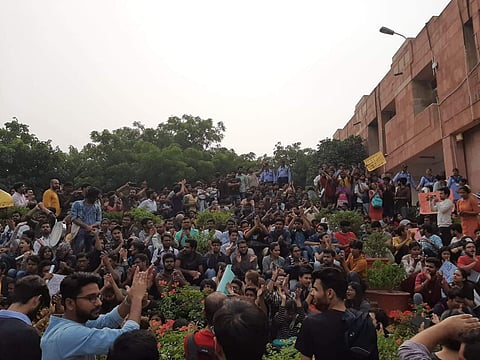

The recently elected Jawaharlal Nehru University Teachers' Association cabinet has expressed concern at the "current situation" in the university, for which, they feel, "the misgovernance of the JNU Administration under the current VC and its concerted attempts to run the University through fiat rather than through consultations and institutions" must be held responsible.
Dr D K Lobiyal of the School of Computer and System Sciences, who was elected, unopposed, as the JNUTA President on October 29, said that the JNU administration has no proper leadership. "The university harps, in its website and even on paper, about how it is all about leadership but that leadership is what is amiss here," said Dr Lobiyal. "I have held this post once before and we have had discussions with the administration but the current management does not want to address any of the core issues. They would rather divert the topic and put the blame on associations or the students," she said, talking about the ongoing lockdown at the university.
The current JNUTA cabinet, in its first statement, said that from the denial of Diwali bonus to the safai karamcharis and the threat of lay-offs to the decision to revise the hostel manual and increase hostel charges, it is the JNU administration which has been the "chief actor behind creating the widespread and legitimate discontent that is finding expression in the agitations being witnessed in the university." "We are not part of the lockdown directly but we feel the administration is to blame for all of this and they should engage in a dialogue with the concerned agents," added the President. "What has added fuel to this fire is that, instead of engaging in a dialogue with the representatives of students or the karamcharis, the JNU administration has illegally and arbitrarily dispensed with even the student representation in the IHA that is guaranteed by statutory provisions," he said.
The JNUTA statement also noted that these recent moves of the administration "reflect a process of attempted restructuring of the university wherein the institution increasingly abandons its responsibilities to its employees as well as to its students and undermines the egalitarian ethos which has been a hallmark of JNU." The statement further adds, "In this new JNU, a wage cut is effectively delivered on the lowest paid and most vulnerable sections of the staff which serves the University. In this new JNU, the hostel charges for students is sought to be raised exorbitantly in order to transfer the financial burden on to residents."
With this move, the JNUTA feels, the message that is being sent out is that JNU is heading in a direction where "its doors will be closed to all but those privileged enough to have the ability to pay." This may even force several current students to leave their education midway, says the JNUTA, as the University’s own data shows that more than 40 per cent of students admitted to JNU are from families with incomes less than Rs 12000 per month.
"Further increases in prospectus and application fees are also on the cards to cover the steep increase in entrance examination costs that has been the result of transferring the responsibility for conducting these examinations to the NTA (a 600 per cent increase was attempted last year itself)," added the president. "Steps like these are the logical culmination of the moves towards ‘graded autonomy’, HEFA borrowing and signing of a tri-partite MoU (between the University, UGC and MHRD) — all of which shared an emphasis on reducing public funding of universities and increasing the burden of fees or user-charges," he said.
The JNUTA, in its statement, demanded an immediate withdrawal of the unreasonable decisions of the University Administration and urges it to enter into a dialogue with the affected parties. "The JNUTA is aware that there are several issues concerning teachers – reduced funding for libraries, labs and research, increased charges for faculty and staff residences, non-payment of arrears for allowances, non-payment of enhanced employer’s NPS contribution — that are being sought to be legitimised through the same logic of lack of funds, even though an enormous increase in expenditures on security and surveillance invites no such reasoning," said the statement.
